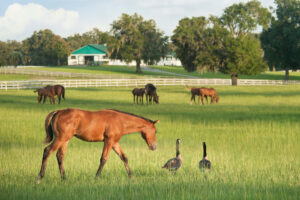Metabolic Syndrome Dangerous for Pregnant Mares (AAEP 2012)
Equine metabolic syndrome–defined as obesity, insulin resistance, and high insulin levels circulating in the bloodstream–is a dangerous condition for any horse, but it puts pregnant mares in an especially precarious in situation. Owners and veterinarians should address metabolic syndrome and related conditions (such as laminitis and insulin resistance) in these horses to minimize risk of fetal compromise and abortion.
"During pregnancy, metabolic syndrome is a normal occurrence because it helps redirect nutrients from the mare to the developing foal," explained Peter Morresey, BVSc, MACVs, Dipl. ACT, ACVIM, of Rood & Riddle Equine Hospital, in Lexington, Ky. Problems can arise, however, if the mare already has metabolic syndrome before she is in foal. He described managing such cases in a presentation at the 2012 American Association of Equine Practitioners’ Convention, held Dec 1-5 in Anaheim Calif.
"In mares that have metabolic syndrome before they become pregnant, the condition can become exacerbated," he explained Morresey. For example, mares with metabolic syndrome have alterations in insulin and lipid (good and bad fats) circulating in their bloodstream, can develop laminitis, and potentially abort the fetus.
Morresey went on to note that mares that have metabolic syndrome before becoming pregnant are generally less sensitive to the hormone insulin than their healthy counterparts, resulting in higher-than-normal blood glucose levels
Create a free account with TheHorse.com to view this content.
TheHorse.com is home to thousands of free articles about horse health care. In order to access some of our exclusive free content, you must be signed into TheHorse.com.
Start your free account today!
Already have an account?
and continue reading.

Related Articles
Stay on top of the most recent Horse Health news with

















